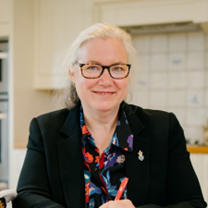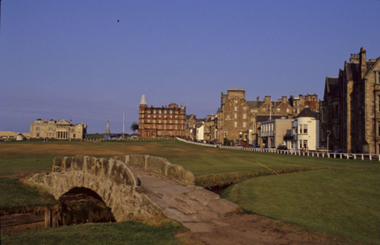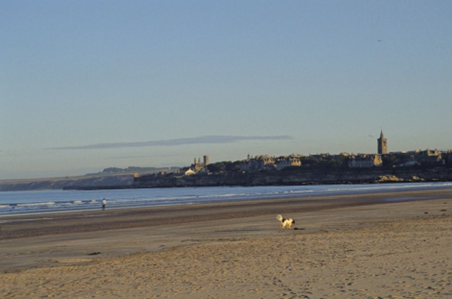Leaving a legacy: Alexandra Walmsley
Alexandra Walmsley graduated with a degree in Modern History and International Relations from the University of St Andrews in 1993 and went on to complete a PhD in Modern History here in 1998.
Alexandra has over 25 years’ experience in the nuclear and defence sectors in the UK and the US. She is the Director of Ashbourne Strategic Consulting Ltd and the UK Managing Director of GEL Laboratories. In 2019, she was appointed as an Adviser to Newton Europe.
The Legacies team asked her why she applied to study here, what her favourite memory of St Andrews is and what prompted her to leave a legacy to the University.
Why St Andrews?
When I applied to the University of St Andrews it was pre-internet. Since the only (very limited) information available was via a tatty paper prospectus my mum, dad and I decided to visit it for ourselves. I always remember being driven in a taxi from Leuchars station along the Guardbridge Road when we turned a bend and suddenly the Chapel and Hamilton Hall were revealed in all their glory against the skyline. The sun was shining, the sea was dark blue, and the fields were green. It was like a fairy-tale. I fell in love with the place.
In those days applying for university consisted of filling in 10 lines on your UCCA form – and that was it. Admissions at St Andrews must have seen something in those 10 lines that convinced them I was worth it, however, and they offered me a place. My schoolteachers thought I wouldn’t get the A-level results I needed to get in but – determined to prove them wrong – I knuckled down, got my A level results and then never looked back!
While I was at University I taught, tutored and lectured too. And as so many people do, I married somebody from St Andrews. He wasn’t a student at the University, but we have a shared St Andrews experience because his dad was a professor and the Vice-Chancellor, and he grew up there. If you were in our house right now, you would see two posters of St Andrews on the wall in the kitchen and there’s also St Andrews stuff belonging to each of us in all the other rooms. It really is a special place for us.
After graduating I tried to get a job – which wasn’t as easy as you might think! I eventually managed and have spent the last 20 something years being a defence and nuclear consultant, because that is what you do with a PhD in modern Lithuanian history, isn’t it?!
What is your favourite memory of St Andrews?
I have two, really.
My first memory is of walking along West Sands away from the town until I reached the end of the beach. I would spend some time watching the seals and then, when I turned around, I would see the stunning view of Sally’s tower and the town in front of me. It got me every time.
I also remember that during my third and fourth undergraduate years I had the best history lecturer and tutor anyone could ever hope for, and a great tutor group. We would sit every Wednesday in his office on the first floor of St Katharine’s Lodge, with a wonderful view out to the sea. The juxtaposition of this amazing historic building with the quality of teaching and learning that took place there was something that I’ll never forget.
Why did you decide to leave a legacy?
I’m now at a stage in my life where I know that I’m not going to have children and I’m in the very fortunate position where I’ve got a sizeable chunk of money at my disposal.
Some people think it’s quite morbid to write a will in your 40s and 50s, but if I got hit by a bus when I was crossing the street tomorrow it would be awful if I hadn’t made sure that my money went somewhere it could really help other people.
When I was applying to do my PhD, it was virtually impossible to get funding in arts subjects because there was a perception at that time that it should go towards science or science-based work.
In my day it was the British Academy that awarded funding, and to get that you needed a First. I was not a stellar student; I was a 2:1 all the way through, so that wasn’t an option for me. That’s why I will always be grateful to the Department of Modern History for awarding me a departmental scholarship to cover my PhD fees. One of my friends who did her PhD at the same time as me took twice as long because she had to work as well. I was lucky – I didn’t have anything to distract me from my research. It made all the difference.
Now I’m in a position to give back by setting up a scholarship that will help other History or International Relations students who haven’t got access to PhD funding.
What would you say to someone who is considering leaving a legacy?
First and foremost, write a will! You can have all the great intentions in the world, but if something happens and you haven’t put those intentions down on paper, then your estate will automatically go to your other half or to your direct descendants.
If you’ve decided to leave a legacy to St Andrews, then I would recommend that you start a dialogue with the Development team. You can then join the Chancellor’s Circle and meet other people who want to support St Andrews in this way.
I talked to the team about leaving the University my London property and decided in addition to have a paving stone engraved with my initials in the Quad, because I thought it would be nice to leave a mark on this earth, especially when I’m not going to have children or grandchildren who will remember me.
I also thought it would be an awesome legacy if –100 years from now – the Ashbourne-Walmsley Scholarship made it possible for somebody to study ‘21st century Brexit and its impact on International Relations’ without having to do three jobs in their spare time.
And finally, I would say that a legacy to the University will have implications that reach far beyond this small town on the north-east coast of Scotland. St Andrews alumni are to be found all over the world, using the skills and knowledge they developed here to the benefit of us all.
So really, whatever you leave the University will have an impact far beyond KY16.


